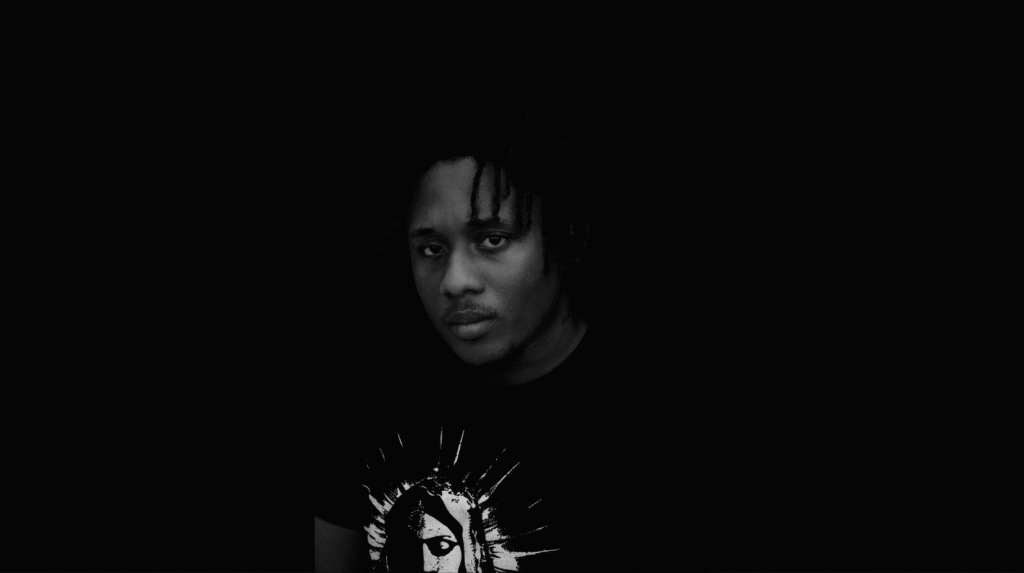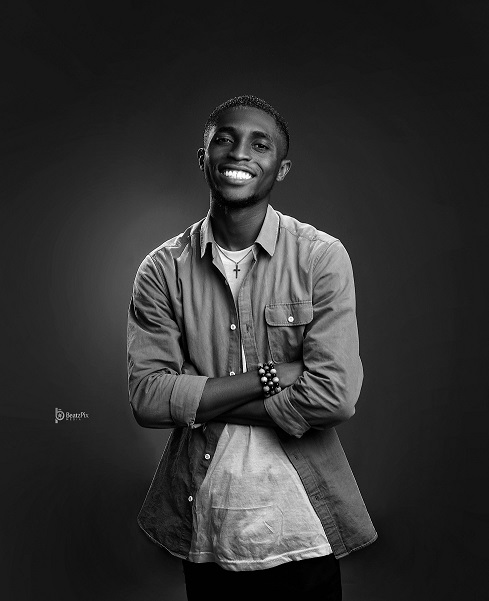Uwana Anthony taught himself in small steps: he began by capturing the everyday life around him, then he slid into formal photography, then experimented with performance art, then filmmaking proper. The organic progression showed him a way to tell more layered stories. He had a deep curiosity, watching films, breaking them down, understanding what made them work. Sticking to the process was a necessity, given that he had no access to the film industry or even financial support.
He also disliked film school and formal education in general. He does not believe that structured systems teach how to explore or think outside the box. One day, in his second year studying Computer Engineering at Bell University, Ota, Ogun State, he had packed his bags and left campus, determined to drop out. He came back shortly after, because his mother convinced him to switch to “an easier department.”
He lost his father when he was a boy and spent a lot of a time with his protective mother. Barred from playing outside in their chaotic neighbourhood, he turned to the small digital camera his elder sister left him. He was 13. His father’s death forced him to wade through life more observant, introspective. Film became an escape, a means to navigate the riot of emotions and memories that were often difficult to put into words. He tried other arts forms — music, designing, writing, painting, drawing, and even debate — but only film, he realised, “had the ability to combine all these elements into a single immersive experience.”
He made his first short film, Everything Must End (2023), with help from friends, on a near-zero budget. Shot in black and white, it follows a young man preparing for his impending death. Uwana directed, shot, and edited the film, and dedicated it to his late best friend Ubon Pius. He describes his style as Afro-contemporary symbolism — his “way of masking heavy narratives in simpler ones, drawing the audience into the film more so they could search for a deeper meaning,” he said. Everything Must End was selected for the 2024 S16 Film Festival.
Uwana spoke to Open Country Mag about his creative process, his struggle with grief, and the story behind his first project.
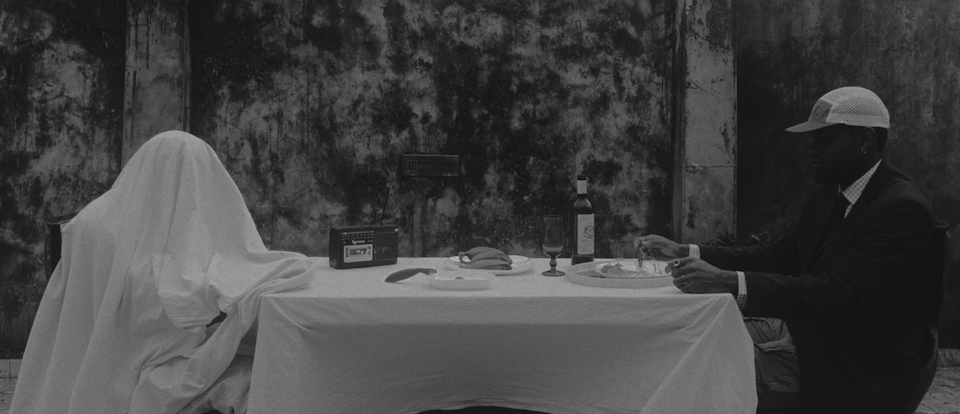
Who are some of your early influences?
I was deeply drawn to the works of Abbas Kiarostami, Djibril Diop Mambéty, Ousmane Sembène, Majid Majidi, and Andrei Tarkovsky. Their ability to tell deeply human stories through minimalism, symbolism, and raw emotion resonated with me. I admired how they could take simple everyday moments and turn them into something profound. That’s what I strive for in my own work, using visual language to communicate emotions and ideas that words alone can’t fully capture.
Watching Everything Must End is akin to viewing a photo album, each scene like a carefully captured snapshot. How did the concept come to you?
I see filmmaking as a series of frozen moments in time, each frame telling a story on its own. My background in documentary photography influenced this approach. I wanted every shot to feel intentional, like something you could take out of the film, print, and still feel its emotion without the context of the full narrative.
The whole film is inspired by my late friend of blessed memory, Ubon Pius, and, to be honest, I wanted to direct it in a way that the people who knew him best would connect with on a much deeper level. There is a scene where the character eats noodles as his “royal last dine.” Some people see it as just a normal moment, and others even find it absurd, but it is far from random. Ubon had a rare type of ulcer, along with other medical complications. He was advised not to eat much solid food, so in his last days, he lived mostly on pap and some horrible-tasting condensed milk. The surgeries were becoming too much, and closer to his end, he told me he did not enjoy life anymore. He hated the hospitals, the medications, and the endless eating restrictions. He even became a day boarder who only came to school two or three times a week. In his final days, Ubon just said, “Fuck all this,” and started eating all the things he had been told to avoid. His absolute favourite was noodles. We were kids in JS3 — can you imagine how it feels for a child to not be able to eat noodles? So, for him, that was it. The noodles were symbolic, representing the character “dining like a king.” It was a statement. “If I am going to eventually die from this illness, let me die eating and doing what I love.”
That was the entire concept of the film. It was all intentional. The shooting idea came from my love for realism blended with symbolism. I developed it through extensive visual planning, storyboarding, experimenting with different compositions, and stripping down scenes to their essential elements. It is about using space, silence, and stillness as much as movement and dialogue.
The film is poetic in every way. The story. The language. The dialogue. Are you a poet? And do you think the story would have worked any other way?
I am everything and nothing at all. I have written music, poems, research and educational material, sold artworks, and more. I run a clothing and art brand with my friends outside my filmmaking space, and I organize art and skateboarding projects. Where am I getting at? I wear creative hats that each help me express my ideas and thoughts in their various mediums. Filmmaking is just one art form. I need more. So, yes, poetry plays a huge role in how I approach storytelling. While I would not necessarily call myself a poet in the traditional sense, I write poems but tend to output them in a different medium.
My style is heavily influenced by poetic structure — rhythm, repetition, and symbolism. The film had to be poetic because grief, spirituality, and internal conflict often cannot be expressed in direct, linear ways. I wanted the audience to feel rather than just watch. Could it have worked another way? Maybe. But I believe the poetic form allows for a deeper connection to the emotions at play.
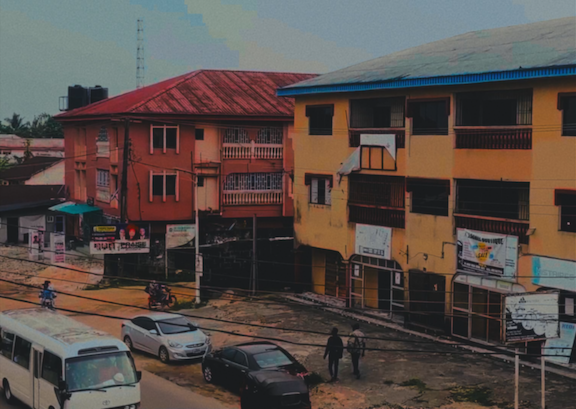
You have described your style as “Afro-contemporary symbolism.” How would you define this genre and what sets it apart from other filmmaking styles? Can you point to other Nigerian filmmakers who are experimenting with similar genres?
Afro-contemporary symbolism is my way of merging traditional African storytelling with modern experimental techniques. It is about using simple, unconventional, or abstract elements to convey deeper narratives — like a single object in a frame holding immense symbolic weight or a seemingly ordinary moment reflecting a larger societal theme. From the colours to the set, styling, characters, and choice of words, everything represents a bigger narrative, directly or indirectly.
This style started as my way of masking heavy narratives in simpler ones, drawing the audience into the film more so they could search for a deeper meaning. My hope is that you put the pieces together yourself while I just guide you where to look.
Sometimes I want to say something without saying it at all. Like when you and your friends are having a conversation in a group and you use certain phrases, signs, and language to communicate discreet messages to a single person in the group. I do not care how many people get it. There is something in hip hop called punch lines. Sometimes they appear normal but have a greater underlying meaning while still making sense in their simpler form. This is it. It uses punch lines, references, symbols, poetry, and unconventional direction to communicate.
At the end of Everything Must End, death dances with Adams. While this scene might appear as an ethereal way to highlight an angel of death exiting with its subject, it is actually a reference to a story my mom told us about her grandmother. She said she danced, sang, and rejoiced with the heavens on her deathbed, minutes before she passed away. It is quite a popular story, among Southern Nigerians and in some parts of Africa, that angels or spirits perform a dance ritual with good people before they pass — maybe as a sign of respect or congratulations, I do not really know. So that scene was a display of a death ritual. It was a stronger reveal to people who have also heard stories like that. You see the scene and are immediately taken back to that story or folklore you heard as a kid. It feels nostalgic, resonating. It is a movement and a cause for change in our approach to pursuing knowledge.
The same way that poems are deeply symbolic and usually connect to a bigger plot — that is what Afro contemporary symbolism attempts to do. I want to symbolize the African story and struggle in a way that mostly only Africans would be able to see the bigger plot, in ways the rest of the world would deem foreign to them. I want to change the African narrative without them even knowing. How do I connect modern African struggles to a deeper traditional foundation in ways that appear subtle and raw? That is Afro contemporary symbolism.
It is different from mainstream Nollywood because it is not driven by commercial formulas. It is more abstract, often slower, and allows the audience to interpret rather than just consume. Filmmakers like Abba Makama and C.J. Obasi have similar experimental approaches. They blend culture, folklore, and nonlinear storytelling in ways that push the boundaries of African cinema. But in terms of Afro contemporary symbolism, I am not sure about any filmmakers here exploring this exact path I am on. They probably exist; I just have not discovered them yet.
Your website describes your creative journey as “a coping mechanism for the untimely loss of your father and the challenges of growing up in Nigeria’s vibrant south-south region.” Can you elaborate on how this experience shaped your voice and perspective?
Losing my father at a young age forced me to process emotions I did not fully understand at the time. I lost him when I was nine years old, and I was already being told to be a man, grow up, be strong for my mother. It was mostly me, my mom, and my immediate sister. My other siblings were not around. His death stole a lot of joy from me. Everything changed drastically. It was like we were relearning how to live, and everyone had to be on their toes, adjusting immediately so they could support Mother and not give her any more tough times.
My mother was going to court and dispute meetings for over a year. She lost weight, stopped going to church, cut her hair, and withdrew from a lot of things she used to enjoy. I could not be the baby holding her back. She did not renew DSTV after he passed, so, yeah, I stopped watching cartoons at nine. Her burden was also my burden.
The worst part was that I could not, or did not even know how to, grieve properly — or if I should grieve at all. From the time I lost my dad till today, I do not think my mom or siblings have ever seen me cry. It is not possible unless you saw a ghost. That was how I had to live — locking up emotions as a kid, trying to play adult and independent. I only cried in my space or in my room. Once I was in public or with family, I had to be my strongest and appear as an adult. I could not relate to things kids my age did because I had to speed past that era. Art became a way to navigate that burden and grief. My perspective as a filmmaker is deeply rooted in this — capturing quiet struggles, unspoken pain, and the resilience required to keep going.
Growing up in the south-south also exposed me to a blend of traditions, modernity, and contradictions. That duality informs my work. I explore themes of isolation, spirituality, and identity because they are questions I have had to ask myself.
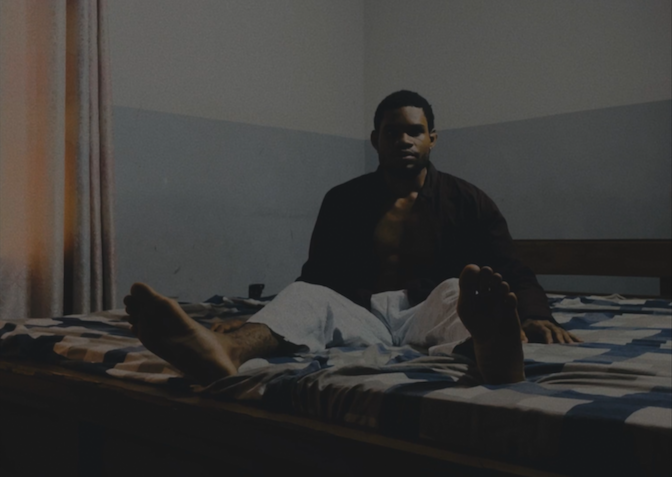
You shot Everything Must End in mostly black-and-white.
The film is about 40% colour and 60% black-and-white. Black-and-white strips an image down to its essence — light, shadow, texture, and emotion. For this film, it was not just an aesthetic choice. The areas in black-and-white heighten the themes of grief and solitude. Removing colour forces the audience to focus on expressions, movement, and atmosphere. It also allowed me to play with contrast in a way that mirrors the internal conflict of the characters — light versus darkness, presence versus absence. The starkness makes every frame feel more intimate, like a visual meditation on the emotions at play. It is all part of Afro-contemporary Symbolism.
Nollywood has a storytelling problem, and, years ago, we published a recommendation of book adaptations that could put the industry back on the right path. How do you see this problem, and what challenges do you face as a young indie filmmaker?
I think the problem with storytelling in Nollywood is not a lack of talent but the way commercial success is prioritized over artistic depth. Believe me, we have talent here. At some point, Nigerian music was overlooked and even looked down on by Nigerians themselves. That was not because the talent was not there, but because of underfunding, lack of proper marketing, limiting creativity, and, most importantly, over-commercialization. It is the same with Nollywood. That is why I respect modern African filmmakers like Lemohang Mosese, CJ Fiery, and Rungano Nyoni. They have been able to tell authentic stories while still finding a way to commercialize them properly without losing their essence.
My approach has always been to focus on authenticity, telling stories that matter even if they do not fit into mainstream structures. I would rather make something real and impactful than force a story into a template, just to make it sell.
One of the biggest challenges as an indie filmmaker is financing. Telling meaningful stories takes time, patience, and a level of detail that the commercial system does not always allow. Distribution is another problem. Getting these stories to the right audience is not easy when the mainstream industry is built around mass appeal. But I see these limitations as part of the journey. They force me to be more creative in how I make and share my work.
Are there support systems by established filmmakers? Any available for newcomers that you’re aware of, or that you are part of? And do you really think they are helpful?
There are a few mentorship initiatives and film labs, but access to them can be difficult, especially for those who don’t have industry connections. A lot of the time, young filmmakers have to carve their own paths. Personally, I’ve found more support in independent creative circles; people who are also trying to tell unconventional stories. I also enrol in workshops when I can.
I’m currently part of a film collective called FLUID LAGOS which started as just a resident workshop thing. We try to exchange resources and help each other as much as possible. So, for me, it’s more a community-driven effort than an institutionalized support system.
While these initiatives exist, I think they need to be more inclusive and genuinely accessible to emerging filmmakers outside of the usual networks, because, honestly, we need them. I need them. I’m trying to fund my next film and it’s been a hassle. ♦
If you enjoyed what you just read, consider making a PayPal donation to enable us to publish more like it.
No One Covers Nollywood Like Open Country Mag
— The Best Films, TV, and Performances of the Year: 2023, 2024
— Rita Dominic‘s Visions of Character
— The Epic, Transformative Comeback of Chidi Mokeme
— In Dika Ofoma‘s Short Films, the Drama Is in the Mundane
— Fatima Binta Gimsay Got Her Start by Asking
— How Dakore Egbuson and Tony Okungbowa Traverse Trauma in YE!
— With the S16 Film Festival, an Arthouse Collective Locks Its Focus
— How Tolu Obanro, Nollywood’s Top Composer, Crafts the Sounds of Its Biggest Hits
— A Small Indie Producer Bets on Social Justice Cinema
— A Tribe Called Judah, Reviewed: A Box Office-Breaking Heist of Authenticity & Heart
— How Mami Wata Swam to Sundance
— How Yahoo+ Captured a Desperate Side of Internet Fraud
— Awaiting Trial: Families of SARS Victims Speak in Devastating Documentary

